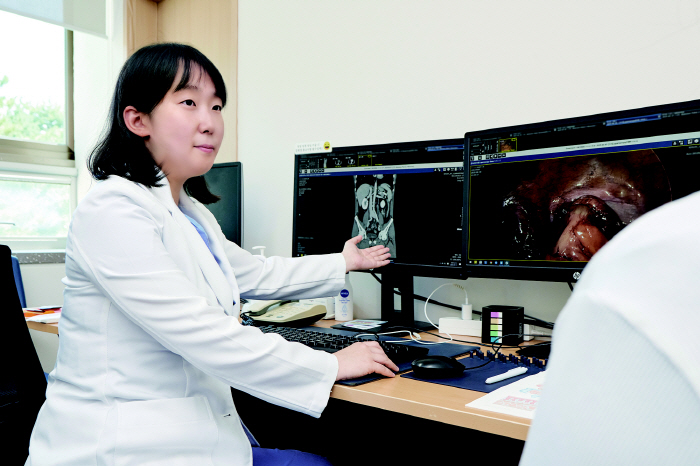Tricky rectal cancer, anal preservation surgery without stoma?
Oct 16, 2025
|
Together with Professor Lee Ha-young of gastrointestinal surgery at Gangdong Kyunghee University Hospital, we will look at the diagnosis and treatment of colorectal cancer, focusing on rectal cancer.
◇Located deep in the pelvis, difficult to operate rectal cancer
Colorectal cancer is a malignant tumor that occurs in the large intestine from the distal end of the small intestine to the anus.
Among them, cancer that occurs in the rectum, which is about 15cm close to the anus, is called rectal cancer.
The rectum is anatomically located deep in the pelvis, making it difficult to access surgery. In addition, nerves responsible for urination and sexual function are concentrated, so precise treatment strategies are needed considering functional preservation. Above all, the preservation of the anus varies depending on the location of the tumor, so the method of surgery must be changed in detail to maintain the quality of life of the patient after surgery.
◇Changes in bowel habits, blood excrement, and major signs of rectal cancer
Because rectal cancer occurs in areas close to the anus, symptoms also differ from other colorectal cancer. It is common for the stool thickness to become thinner or for residual stool to remain after defecation, and constipation and diarrhea are also repeated. It is easy to mistake it for hemorrhoids because it is accompanied by bloody stools and mucous stools. In addition, rectal pain, bleeding during defecation, anemia, and weight loss can occur, and progress can lead to serious symptoms such as abdominal distention or intestinal obstruction.
◇Major causes such as excessive consumption of processed meat, drinking, smoking, etc
The cause of rectal cancer is basically the same as other colorectal cancer. Incorrect lifestyle habits such as excessive red meat and processed meat consumption, drinking and smoking, obesity, and lack of exercise are major risk factors. In addition, if you have a history of colon polyps, inflammatory bowel disease ( ulcerative colitis and Crohn's disease), and a family history, the risk is high. Some are also associated with genetic factors, so the incidence is high in familial adenomatous polyposis (FAP) and Lynch syndrome.
◇Early screening is the key to rectal cancer prevention and survival rate
Colorectal cancer, including rectal cancer, has few initial symptoms, so regular check-ups are more important than anything else. In the national cancer screening project, fecal occult blood tests are conducted free of charge every year for those over 50 years of age, and colonoscopy is recommended in case of abnormal findings. Colonoscopy is effective for prevention and early treatment as it can immediately remove polyps, a precancerous lesion. High-risk groups such as family history, history of polyps, and inflammatory bowel disease are recommended before the age of 50.
◇ Customized rectal cancer surgery considering function preservation
The basis of rectal cancer treatment is surgery. Since the rectum is a region where nerves are concentrated because it is close to the anus, the surgical method varies depending on the location of the tumor and the stage.
Recently, surgery methods to preserve anus, such as low anterior resection (LAR), sphincterostomy (ISR), transmural local resection (TAMIS/TEMS), have been developed, and more and more cases are avoiding the installation of intestinal fistula. If you don't make a stoma, you'll be free from the burden of lifelong management, and the inconvenience of daily life will be greatly reduced, and it's also positive for improving the psychological stability and quality of life of patients. As minimally invasive surgery using laparoscopy and robots is actively performed, the burden of pain and recovery can be reduced, and nerves can be precisely preserved even in a narrow pelvis.
Anti-cancer and radiation treatments are performed in parallel according to the stage, and in advanced rectal cancer, pre-operative chemotherapy and radiation treatments reduce the size of the tumor to increase the success rate of surgery. Professor Lee Ha-young emphasized that "Since rectal cancer greatly changes the patient's quality of life after treatment, a customized treatment strategy that considers function preservation as the top priority is needed.'
◇Important postoperative management and lifestyle improvement
After surgery, it is important to stabilize your bowel habits with sedentary bathing, medication, a fiber-rich diet, and sufficient water intake. In addition, professional rehabilitation treatments such as pelvic floor muscle rehabilitation exercise can help restore bowel and urination functions. Regular exercise and prevention of constipation are key to preventing recurrence, and lifestyle improvements such as smoking cessation and abstinence are also effective in preventing colon cancer as a whole.
Professor Lee Ha-young advised "As life management after treatment determines the quality of life of patients, constant follow-up tests and rehabilitation and lifestyle management are essential."
|
This article was translated by Naver AI translator.















